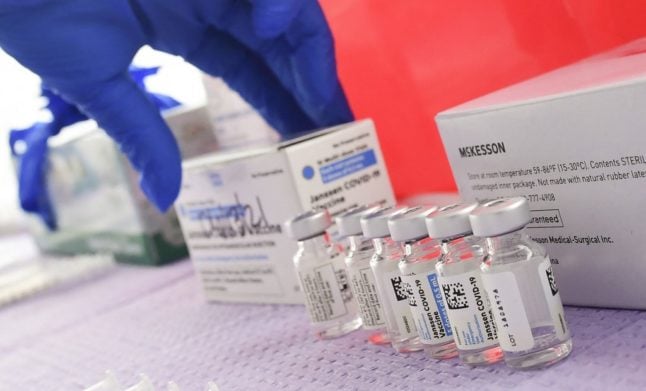Vaccination is meanwhile one of the three key criteria authorities in the country say they will assess before lifting measures.
READ ALSO:
- Norway to allow alcohol sales as it starts lifting virus curbs
- Norway unveils four-step plan for lifting Covid-19 restrictions
With the European rollout of the Johnson & Johnson vaccine now delayed, how is Norway’s road out of the pandemic affected?
Why it is delayed
Pharmaceutical company Johnson & Johnson is delaying the rollout of its single use Janssen vaccine in Europe due to concerns over rare potential side effects detected in the United States.
The suspected symptoms include blood clots combined with low platelets in persons who have received the vaccine, according to the company.
“We have taken the decision to proactively delay the rollout of our vaccine in Europe,” Johnson & Johnson said in a statement.
“We have been working closely with medical experts and health authorities, and we strongly support the open communication of this information to healthcare professionals and the public,” it added.
According to the company, the United States Centre for Disease Control and the Food and Drug Administration are reviewing six reported cases in of severe potential side effects that have occurred out of more than 6.8 million doses administered.
Norway’s plan for the vaccine
The Johnson & Johnson vaccine was set to play a vital role in Norway’s aim to offer everyone over the age 18 a vaccine by mid-July.
Norway had ordered over a million vaccines in total. 52,000 doses were set to arrive in April, with a million more coming in June.
The vaccine was to be used primarily to vaccinate people aged between 18-44.
“For many in the age group, this (first dose) will probably be the last dose, because we plan to use the Janssen vaccine from Johnson & Johnson on this group,” director of infection control at the Norwegian Institute of Public Health Geir Bukholm previously told broadcaster NRK.
The vaccine is 66.9 percent effective against moderate symptomatic cases of Covid-19 and 85 percent effective against severe risk of hospitalisation, according to the World Health Organisation.
It would therefore make sense to have used the vaccine on groups with a lower risk of developing severe cases of Covid-19.
How will the delay affect Norway’s vaccination program?
Norway’s programme for vaccinating its population faces a setback with potential delays of 8-12 weeks if the country decides it will no longer use the Janssen vaccine and also chooses not to reimplement the AstraZeneca vaccine, which remains suspended, also due to concerns over potential side effects.
The estimate, which could see everyone over the age of 18 in Norway being offered a vaccine by October, rather than July, was given by department director at the Norwegian Institute for Public Health (NIPH), Line Vold.
“If both AstraZeneca and Johnson & Johnson are excluded, vaccination can be completed 8-12 weeks later provided other vaccines are delivered,” Vold said on Tuesday.
The vaccine schedule should now be changed with vaccines being distributed to areas of high infection as well as introducing a longer interval between doses, according to an expert.
“One measure is that there will be a longer distance in the time between dose one and dose two. The second is a strong skewed distribution geographically,” Steiner Holden, an economics professor who assesses the socio-economic impact of the pandemic told NRK.
Health minister Bent Høie, however, is still optimistic about Norway’s current vaccination program.
“We see that with the two vaccines we are using (Moderna and Pfizer), we are now vaccinating a significant amount and the supply of the two vaccines will increase in the future,” Høies told NRK.
How will the delay affect Norway’ plan to reopen?
Norway has a four-step plan to reopen society and before each step government will assess three criteria before moving to the next phase of the plan.
The criteria are:
- Infection situation and infection rates
- Capacity within the health service
- Vaccination
Norway will enter phase one on April 16th. The delay of Johnson & Johnson’s rollout in Europe will not affect the country embarking on the first step.
Nor will it currently affect the second step, which could take place in May, according to Prime Minister Erna Solberg.
“For the reopening going forward, there are still three parameters we must consider, and the vaccines are one of them. The bulk of the Janssen vaccine would arrive in June, so for the next step in May, it will be less important,” she said at a government briefing.
However, any delay with the vaccination program will put a much larger burden on the other checkpoints being met.
“But it is important we finish the vaccination program; we must be clear about that. Until then is even more important that we achieve results on the other two parameters, the infection situation and the capacity in the health care system. The fewer vaccinated, the more important the other parameters become in reopening further;” Solberg said.



 Please whitelist us to continue reading.
Please whitelist us to continue reading.
Member comments